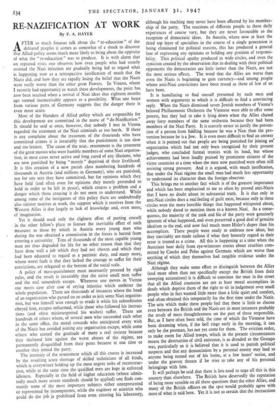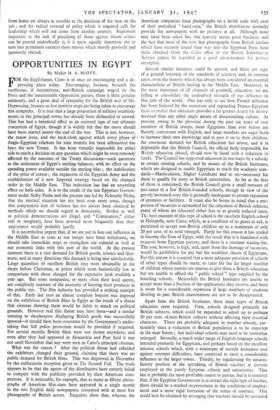RE-NAZIFICATION AT WORK
By F. A. HAYEK
AFTER so much fatuous talk about the " re-education " of the defeated peoples it comes as somewhat of a shock to discover that Allied policy seems much more likely to bring about the opposite of what the " re-education " was to produce. It is with alarm that on repeated visits one observes how even people who had stoutly resisted the Nazi infection are gradually being led to regard what is happening now as a retrospective justification of much that the Nazis did, and how they are rapidly losing the belief that the Nazis were really worse than the other great Powers. In Vienna, where I recently had opportunity to watch these developments, the point has now been reached when a revival of Nazi ideas that eighteen months ago seemed inconceivable appears as a possibility. What one hears from various parts of Germany suggests that the danger there is even more acute.
Most of the blunders of Allied policy which are responsible for this development are committed in the name of " de-Nazification." It, should be said at once, however, that nobody I met in Vienna regarded the treatment of the Nazi criminals as too harsh. If there is any complaint about the treatment of the thousands who have committed crimes it is invariably that the punishment is too slow and too lenient. The cause of the acut.: resentment is the treatment of the great masses who were humble members of some Nazi organisa- tion, in most cases never active and long cured of any illusions, who are now punished by being " merely " deprived of their livelihood.
• It is this creation of a new pariah class numbering hundreds of thousands in Austria (and millions in Germany), who are punished, not for any acts they have committed, but for opinions which they have held (and often even for opinions they merely pretended to hold in order to be left in peace), which creates a problem and a danger which those creating it do not seem to understand. While among some of the instigators of this policy there are undoubtedly also sinister motives at work, the support which it receives from the Western Allies is due largely to lack of knowledge and, even more, of imagination.
Yet it should need only the slightest effort of putting oneself in the other fellow's place to foresee the inevitable effect of such measures as those by which in Austria every young man who during the war obtained a commission in the forces is barred from entering a university. Tens of thousands of the most capable young men are thus degraded for life for no other reason than that they have done well a job which they had not chosen and which they had been educated to regard as a patriotic duty, and many more, whose worst fault is that they lacked the courage to suffer for their convictions, are relegated to the bottom of the social scale.
A policy of mass-punishment must necessarily proceed by rigid rules, and the result is invariably that the naive small men suffer and the real scoundrels escape. Wherever one moves in Vienna one meets case after case of crying injustice which embitter the whole population. There are thousands of instances where the head of an organisation who passed on an order to join some Nazi organisa- tion, but was himself wise enough to evade it while his subordinates obeyed him, escapes unharmed, while those who followed his instruc- tions (and often misinterpreted his wishes) suffer. There are hundreds of others where, of several men who succeeded each other in the same office, the moral cowards who anticipated every wish of the Nazis but avoided joining any organisation escape, while some others who earned the gratitude of many a real resister because they sheltered him against the worst abuses of the regime, are permanently disqualified from their posts because at one time or another they joined the party. The intensity of the resentment which all this causes is increased
by the resulting acute shortage of skilled technicians of all kinds, which is everywhere holding up the most urgent tasks of reconstruc- tion, while at the same time the qualified men are kept in enforced idleness. Especially in the field of higher education (where admit- tedly much more severe standards should be applied) one finds con- stantly some of the most important subjects either unrepresented or represented by incompetents, while the engineer or scientist who could do the job is prohibited from even entering his laboratory,
although his teaching may never have been affected by his member- ship of the party. The reactions of different people to these daily 'experiences of course vary, but they are never favourable to the reception of democratic ideas. In Austria, where now at least the third top layer of specialists in the course of a single generation is being eliminated for political reasons, this has produced a general fear .of expressing any opinions or holding any position of responsi- bility. This political apathy produced in wide circles, and even the cynicism created by the observation that in dealing with their political opponents the democracies are little better than the Nazis, are not the most serious effects. The word that the Allies are worse than even the Nazis is beginning to gain currency—and among people whose anti-Nazi convictions have been tested as those of few of us have been.
It is humiliating to find oneself presented by such men and women with arguments to which it is difficult-to find a convincing reply. When the Nazis dismissed seven Jewish members of Vienna's beloved Philharmonic Orchestra the Viennese were able to offer some protest, but they had to take it lying down when the Allies chased away forty members of the same orchestra because they had been members of the Nazi Party. It is scarcely easier to justify the preven- tion of a person from fiddling because he was a Nazi than the pre- vention because he is a Jew. It is even more difficult to find an answer when it is pointed out that people are being punished for joining an' organisation which had not only been recognised by their present judges, who concluded formal treaties with its head, but whose achievements had been loudly praised by prominent citizens of the victor countries at a time when the men now punished were often still resisting strong pressure. And it is argued, with much justification, that under. the Nazi regime the small man had much less opportunity to understand its character than the foreign observer.
This brings me to another fact which is of the greatest importance and which has been emphasised to me so often by proved anti-Nazis that I have no doubt about its substantial truth. It is that only in anti-Nazi circles does a real feeling of guilt exist, because only in these • circles were the more horrible things that happened whispered about, while nobody dared to mention them to a known Nazi. As a conse- quence, the majority of the rank and file of the party were genuinely ignorant of what happened, and even preserved a good deal of'genuine idealism to the end, and now feel much more Hitler's dupes than his accomplices. These people were ready to embrace new ideas, 'but they inevitably are made callous if what they honestly regard as their error is treated as a crime. All this is happening at a time when the Austrians hear daily from eye-witnesses stories about cruelties com- mitted by Czechs and Poles against Germans which are worse than anything of which they themselves had tangible evidence under the Nazi regime.
Although they make some effort to distinguish between the Allies (and more often than not specifically except the British from their sweeping accusations) it is difficult to convince the man in the street that all the Allied countries are not at least moral accomplices in deeds which deprive them of the right to sit in judgement over small people who in fact wanted little more than a little quiet and comfort, and often obtained this temporarily for the first time under the Nazis. The acts which make these people feel that there is little to choose even between the British and the Nazis are in most instances probably the result of mere thoughtlessness on the part of those responsible. But, as I have often been told, the time of which the Viennese have been dreaming when, if the bell rings early in the morning, it can only be the postman, has not yet come for them. The eviction order, to make room for Allied troops, which in the present circumstances means the destruction of civil existence, is as dreaded as the Gestapo was, particularly as it is believed that it is used to punish political suspects and that any denunciation by a personal enemy may lead to anyone being turned out of his home, at a few hours' notice, and under the gravest threats if he tries to take any of his personal belongings with him. It will perhaps be said that there is less need to urge all this in this country than elsewhere. The British have deservedly the reputation of being more sensible on all these questions than the other Allies, and many of the British officers on the spot would probably agree with most of what is said here. Yet it is hot so certain that the instructions
from home are always as sensible as the decisions of the men on the job ; and the radical reversal of policy which is required calls for leadership which will not come from another country. Supremely important as the task of punishing all those against whom crimes can be proved undoubtedly is, it is quite equally important not to turn into permanent enemies those masses which merely passively and ignorantly obeyed.



































 Previous page
Previous page